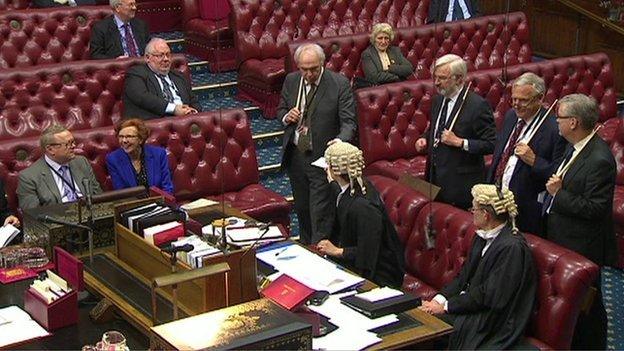Is David Cameron facing a Lords log-jam?
- Published
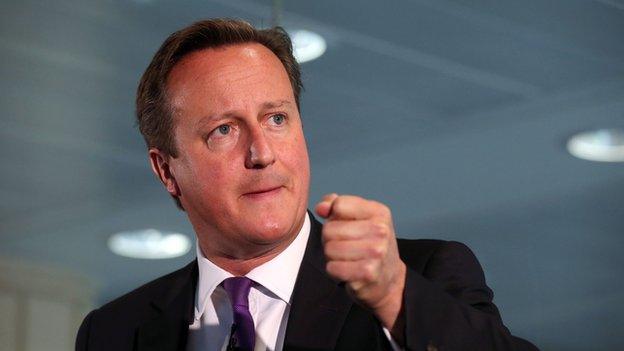
For the first time a Conservative government does not have a majority in the Lords meaning the Upper House could block key policies. Is David Cameron facing a legislative log jam?
In 1945, Clement Atlee's Labour party swept to power on a wave of post-war optimism, with a massive mandate to implement a radical policy agenda.
But it had a problem. Although winning 393 seats gave Labour a huge majority in the Commons, over in the House of Lords, the Conservatives dominated, with some 400 peers compared to fewer than 20 on the Labour benches.
So a solution had to be found, and they came up with the Salisbury Convention - an understanding that an opposition wouldn't use their numbers in the House of Lords to throw out legislation that was in a party's election manifesto, but could revise and amend it.
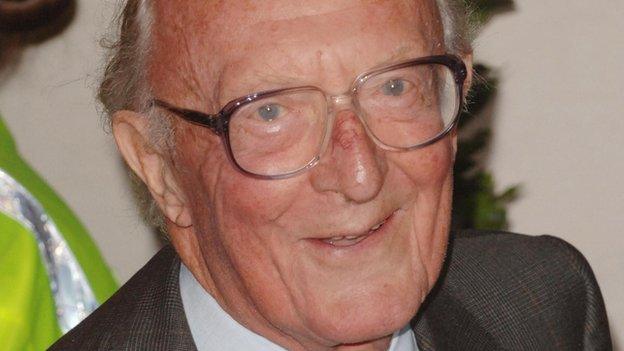
Lord Carrington says the convention makes peers behave appropriately
The longest serving member of the Lords, the former Foreign Secretary Lord Carrington, says that the convention was to stop peers from behaving "rather stupidly".
"If whatever government of the day had been elected on a manifesto, it wasn't up to the unelected House to disrupt it.
"This was the way to restrict the House from really doing things they oughtn't to do."
Listen to Gary's BBC Radio 4 Westminster Hour report on the Salisbury Convention
The convention has been in place for 70 years now, and governments of whatever party could be reasonably confident of winning most votes in the Lords.
'Good governance'
But it has never been tested before when the Conservatives are in power, without a majority in the Lords.
Last time the Conservatives were in government on their own, they had an inbuilt majority in the House of Lords, thanks to a vast number of hereditary peers.
Most of these were removed after reforms introduced under Tony Blair. Now Labour, the Liberal Democrats and crossbench peers easily outnumber the government.
So do some on the Opposition benches sense an opportunity?

Potential sticking points
Replacing the Human Rights Act with a British Bill of Rights - Lib Dem and Labour peers are against it, as are some Conservatives and crossbench peers
EU Referendum Bill - Opposition peers are likely to table amendments to change the wording of the questions and include votes for 16-year-olds
Constituency boundary changes - Labour and the Lib Dems are strongly opposed to plans to cut the number of MPs and equalise the size of constituencies calling it a Conservative plot to rig elections in their favour
English Votes for English Laws - The government has already lost a vote on this in the Lords, who called for the government to set up a joint committee to examine the issue

Labour's leader in the Lords, Baroness Smith of Basildon, says any government has to accept that it will be scrutinised.
"We're not trying to wreck the government's legislation. We accept that they've got a mandate.
"What we will do is take a very responsible but robust line in looking at the detail of legislation in the interest of good governance."
The Liberal Democrats, reduced to just eight MPs at the general election, are a considerable force in the House of Lords, with over 100 peers.
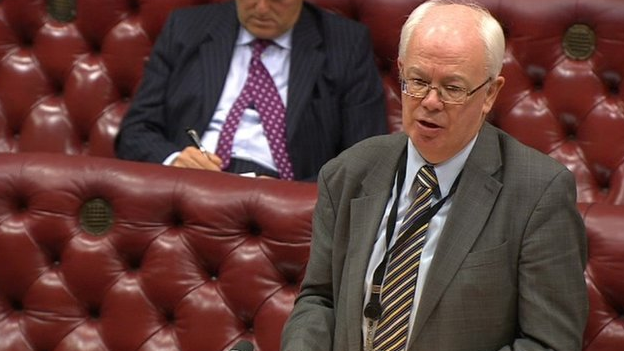
Lib Dems will not block legislation for "fun", says Lord Wallace
Lord Wallace of Tankerness, the Lib Dem leader in the Lords, says his party "didn't sign up" to the convention. Without the support of the Lib Dems, or other opposition groups, the government will struggle to get its bills onto the statute books.
"The position we take is that we must, in the ultimate analysis, retain the right to say no in the House of Lords.
"There may be certain circumstances when the government has just got it wrong."
Clearly the government has a tough time ahead in the House of Lords.
'Exercising restraint'
Conservative peer Baroness Stowell of Beeston, the Leader of the House of Lords, says it would be surprising if "any government" were not defeated on some amendment to its legislation, but warns that opposition parties must not stand in the way of what the Conservatives have a mandate to achieve.
"What is essential is that no opposition party seeks to scupper the government's agenda.
"We need to be careful about what we as a House of Lords seek to do.
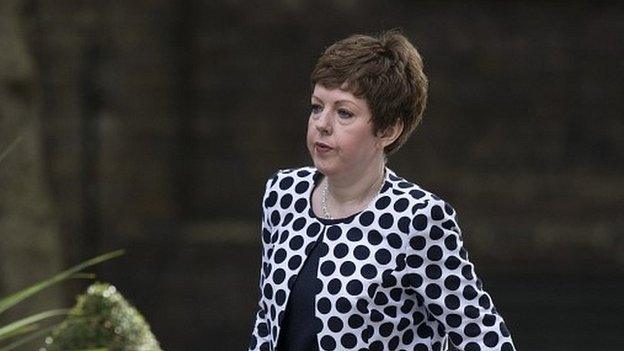
Baroness Stowell says the government must deliver on election promises
"What is important is that all sides recognise that as an unelected House, we have to be accountable. We're accountable by exercising restraint."
Even at this early stage in the Parliament, there are signs that Labour and the Lib Dems plan to make life difficult for the government in the House of Lords. It's been defeated 10 times there already since the election, such as on votes at 16, a key Liberal Democrat commitment,
"We don't just do it for the sheer fun or hell of it," says Lord Wallace.
"Each of these amendments we voted on, and defeated the government, there was a point to them."
Baroness Stowell though, has a warning for her former coalition partners, who are a significant presence in the Lords, but received just 7.9% of the popular vote at the general election.
"I think that the Liberal Democrat party in the House of Lords would be operating outside what anyone would consider acceptable if they started to try and wreck the government's agenda, when they have no mandate to do so.
"That would not be consistent with the democracy we live in."
'Roll over'
The prime minister is expected to appoint a large number of new Conservative peers soon, but that won't change the fact that the government is outnumbered in the House of Lords.
It cannot possibly get its legislation through without the support of at least one of the opposition parties, or the independent crossbenchers.
Labour's Baroness Smith says the government has to persuade peers of its arguments.
But Lord Wallace warns that the Lib Dems would not just "roll over" and that they will support the Conservatives on a case-by-case basis.
Baroness Stowell says that the government is always willing to listen and "take on board" arguments and suggestions to improve its legislation.
But she adds: "We want our bills to deliver on our election promises. What the House of Lords does not exist to do, is to get in the way of what the people of this country have voted for."
- Published7 August 2015
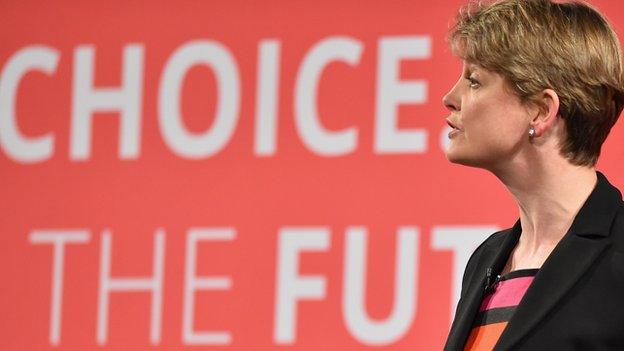
- Published28 July 2015
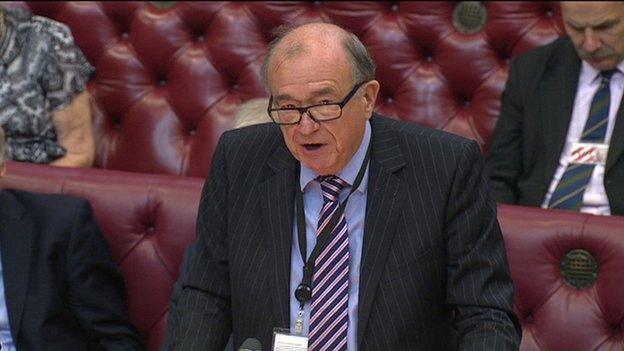
- Published21 July 2015
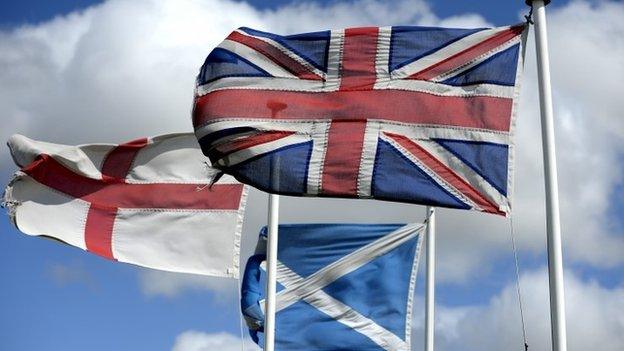
- Published20 May 2015
